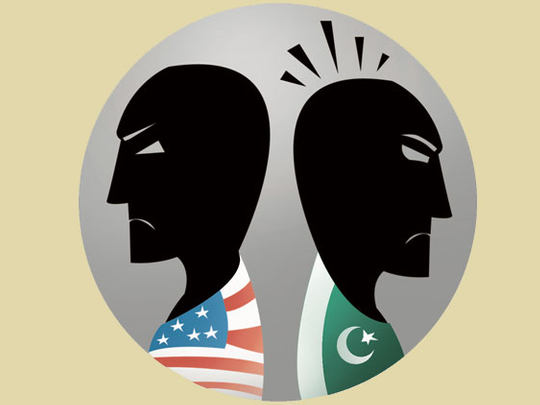
A year after Al Qaida’s founder, Osama Bin Laden, was killed by American commandoes in the Pakistani city of Abbottabad — known for its military institutions, pleasant climate and quality schools — the distrust between Pakistan and the United States has not been overcome.
Rather, the mistrust widened following another incident on November 26, 2011, when Nato air strikes killed 24 Pakistani soldiers in the Mohmand tribal region bordering Afghanistan and caused an outrage in Pakistan. Differences over the circumstances that led to the attack have persisted with Pakistan calling the air strikes deliberate and the US arguing that these were carried out in self-defence.
There was fallout of the deaths of the Pakistani soldiers in what should have essentially been “friendly fire” if Pakistan and the US were truly allies. Pakistan blocked overland supplies for Nato forces in Afghanistan, got vacated its Shamsi airbase in Balochistan from the US drones parked there and boycotted the second Bonn conference on Afghanistan. Such has been the animosity between the two countries that Nato supplies through Pakistan remain blocked five months after the Mohmand Agency incident, the US has continued its drone strikes in Pakistan’s tribal areas using bases in Afghanistan despite Islamabad’s protests and Islamabad and Washington continue to differ on ways and means for fighting the “war on terror” and ending the Afghan conflict.
The relationship wasn’t stable even prior to the raid by helicopter-borne US SEALs on the Abbottabad compound where the world’s most-wanted man had reportedly been living for about six years. Their ties were prone to misgivings and uncertainty, but both sides overlooked the differences and focused on the positives to make the relationship work. However, the Abbottabad attack embarrassed and angered the Pakistan government and its powerful military beyond their endurance level. Complaints of being kept in the dark by their American allies were made and it was argued that US had violated Pakistan’s borders and sovereignty in a manner not seen before.
The US had reasons to celebrate Bin Laden’s elimination as he was its public enemy No 1, blamed not only for the 9/11 attacks, but also quite a few in the past. US President Barack Obama could not let go an opportunity to eliminate Bin Laden after the missed chance in Tora Bora in Afghanistan in December 2001. Upsetting a distrustful ally, Pakistan, wasn’t too big a price to pay if the Obama administration could finally track down and kill Bin Laden. In the process, the US could deliver a strong message that it possessed the capability to take revenge even if the enemy was hiding in another corner of the world.
Unlike the US which declared Bin Laden’s death as a major achievement, for Pakistan it was a huge embarrassment. It has been suggested that Islamabad feigned ignorance even though the US had informed a few top civil and military officials in Pakistan about the Abbottabad raid without identifying that the “high-value” target was Bin Laden because it was felt this would be a lesser embarrassment than admitting that it knew about the intruding American helicopters and yet was unable to do anything about it. The situation could become clear if the Abbottabad Commission set up by the Pakistan government to probe the incident manages to independently finalise its report and persuades the authorities to make its findings public. The commission has been holding its sessions for a year now and has interviewed more than 100 eyewitnesses, civil and military officials, analysts, and even Bin Laden’s three wives.
Efforts to repair the damage to Pakistan-US relations have continued and recently the first high-level American civil and military officials visited Pakistan after the Mohmand Agency incident last November. The talks did not yield any breakthrough as the new terms of engagements recommended by Pakistan’s parliament are problematic for the US, which has its own set of demands in response to those made by Pakistan for an end to the drone strikes and conditional reopening of the Nato supply lines.
As for Al Qaida, Bin Laden’s assassination was the most severe blow it suffered to date. It had been weakened by the Nato military operations in Afghanistan and by Pakistan’s security forces in the tribal areas. The capture of several Al Qaida figures in Pakistan and the death of many others in US drone strikes had further diminished its strength.
Under its new leader, Ayman Al Zawahiri, Al Qaida has been striving to remain relevant to the changing situation best exemplified by the Arab Spring that has empowered the Arab masses to bring peaceful political change in their countries. In hiding apparently in Pakistan and struggling to survive after Bin Laden’s assassination, Al Zawahiri’s foremost weapon nowadays is his frequent videotape messages on issues concerning the Islamic world and the West.
Though Al Qaida isn’t finished and a hardcore of its members still believe that terrorist strikes are the only way to tackle the US and its allies, it is finding it difficult to attract new recruits, provide finances for its activities and control territory in sovereign states.
I knew from two meetings with Bin Laden in 1998 in Afghanistan that he wished to die rather than being captured by the US and humiliated and it so happened that his wish was fulfilled on May 2, 2011. He was also conscious about his legacy and the depleted Al Qaida is now facing an uphill battle to keep it alive and inspire a new generation of followers. Ironically, the unseen image of a dead Bin Laden is being used by President Obama as a resounding achievement of his presidency and a reason why he deserves re-election.
Rahimullah Yusufzai is a senior journalist based in Peshawar.










